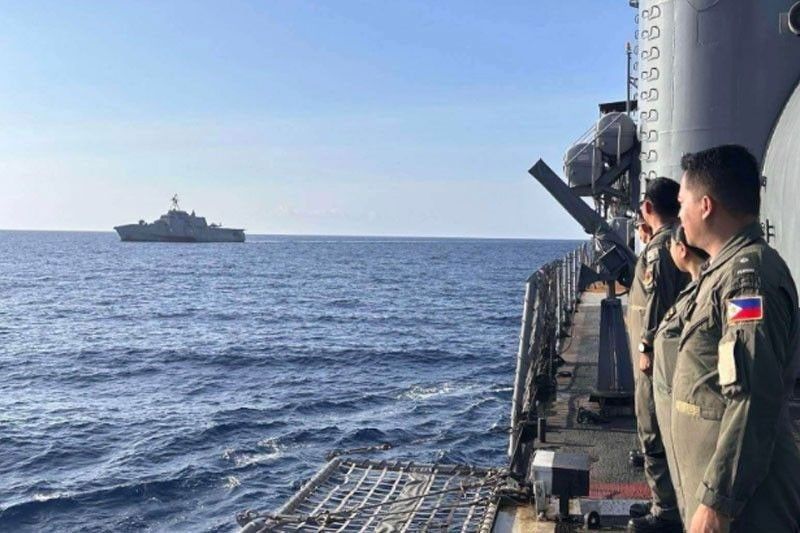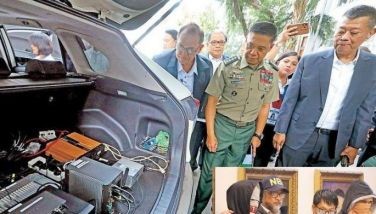New tactics eyed in resupply mission

MANILA, Philippines — A month after getting disrupted by the Chinese, another supply mission to the BRP Sierra Madre in Ayungin Shoal is being readied, with a number of options being considered to make it safe from Chinese harassment including by holding it simultaneously with a joint sail with allied navies, Philippine Navy spokesman Rear Admiral Roy Vincent Trinidad said yesterday.
“We are in close contact with Western Command. The moment that it will be finalized by them and approved for execution, we will know from the public affairs side and we will be informing everybody appropriately,” Trinidad said in an interview over dzBB.
The Western Command’s jurisdiction covers areas in the West Philippine Sea where most Chinese incursions took place.
Trinidad said authorities are still working on the details of the next rotation and resupply (RORE) mission, including possibly carrying it out simultaneously with a maritime cooperative activity with the US.
“It’s not yet approved, it’s just one of the many options being considered and a final approval will come from the top,” he explained.
Trinidad said the AFP is looking at all possible contingencies and would be making recommendations to the higher ups.
The last RORE mission on June 17 was marred by China Coast Guard (CCG) personnel’s boarding of Filipino boats and destroying their navigational and communication equipment using bladed weapons and clubs. The Chinese also stole disassembled firearms. The scuffle that ensued hurt several Filipinos, with one losing a finger.
Trinidad said that there have been fewer CCG, People’s Liberation Army Navy and maritime militia vessels since the Philippines and China engaged in a Bilateral Consultative Mechanism meeting earlier this month.
However, China’s “monster ship,” the biggest coast guard vessel in the world, remains around Escoda Shoal where a Philippine Coast Guard (PCG) vessel is also stationed.
Trinidad said the Philippine Navy continues to issue radio challenges to ships monitored in the area inside the country’s exclusive economic zone.
The monster ship, he said, is at a “safe distance” from the PCG ship, some five to eight miles away.
“That’s safe distance in naval terminology, safe distance that we’re OK, no risk, no threat,” he said.
Balabac runway almost finished
In Puerto Princesa, Palawan, President Marcos said the construction of the military runway on Balabac Island, one of the locations of the Enhanced Defense Cooperation Agreement (EDCA) between the Philippines and the US, is now in its final stage.
Marcos made the announcement during the distribution of aid to sectors hit by El Niño in the province which “plays a huge role in our national security.”
In 2014, the Philippines and the US signed EDCA, a deal widely seen as an effort to counter China’s strong presence in the West Philippine Sea. The agreement gives the US military access to Philippine bases for training as well as for humanitarian and disaster relief activities.
The two countries initially identified five sites for the agreement, namely Cesar Basa Air Base in Pampanga, Fort Magsaysay Military Reservation, Lumbia Air Base, Antonio Bautista Air Base and Mactan Benito Ebuen Air Base.
Balabac Island was among the four new EDCA locations announced last year, along with Naval Base Camilo Osias in Santa Ana, Cagayan; Camp Melchor dela Cruz in Gamu, Isabela and Lal-lo Airport in Cagayan.
The three-kilometer runway is part of the Tatag ng Imprastraktura Para sa Kapayapaan and Seguridad program of the defense and public works departments that started in 2017. The airstrip is designed to serve both military and civilian aircraft.
SWS poll: Government action sufficient
Despite some setbacks, a majority of Filipinos believe government’s actions in the West Philippine Sea are sufficient, according to a commissioned survey conducted by Social Weather Stations.
The June 23 to July 1 survey, commissioned by Stratbase ARD Institute, sought the opinion of Filipino respondents on government’s actions on seven issues related to the West Philippine Sea.
Some 60 percent said they find the conduct of joint patrols with allies, friends and partners in the region “sufficient,” while 36 percent said it was “not sufficient.”
In terms of protecting Filipino fishermen, 57 percent said it was “sufficient” while 41 percent said it was “not sufficient.”
Other issues included in the survey were strengthening military capability of the Philippines (56 percent “sufficient,” 42 percent “not sufficient”), protecting marine resources (55 percent “sufficient,” 42 percent “not sufficient”), referring the issue to international organizations for diplomatic and peaceful negotiations (54 percent “sufficient,” 42 percent “not sufficient,” and gathering evidence of China’s actions (54 percent “sufficient,” 43 percent “not sufficient”).
Based on the survey results released by Stratbase yesterday, only one issue obtained the positive opinion of less than a majority of respondents – demanding that China leave the artificial islands that it illegally constructed and occupied.
Some 49 percent said the government’s action on the matter was “sufficient,” while 47 percent said it was “not sufficient.”
The poll also asked respondents if the Philippine government should form an alliance with other countries in defending the Philippines’ territorial and economic rights in the West Philippine Sea.
Some 72 percent agreed with the statement, while 12 percent disagreed. Some 14 percent said they were undecided on the matter.
The survey had 1,500 respondents nationwide and a margin of error of plus or minus 2.5 percent.
Reacting on the survey results Stratbase president Dindo Manhit said there is a need for more joint patrols with “like-minded nations” given China’s aggression in Philippine waters.
“This year, we witnessed actions – the most aggressive by far – performed against our fellow Filipinos at sea. Our troops, fisherfolk, and vessels encountered several attempts to block rotation and reprovision missions, numerous occasions of firing of water cannons, and an alarming number of collisions and near-collisions,” he said.
“We call on our friends, allies and partners, who also value the rule of law to join us in our fight, and the Philippine government to reinforce cooperation and elevate partnerships by conducting more joint patrols and military exercises in the West Philippine Sea,” Manhit added.
Meanwhile, the names proposed by the Philippines for 25 undersea features have been accepted at the 37th meeting of the General Bathymetric Chart of the Oceans (GEBCO) hosted by the Korea Institute of Geoscience and Mineral Resources. The names will appear in the GEBCO Undersea Feature Names Gazetteer.
GEBCO, consisting of an international group of experts in ocean mapping, is involved in creating and making available data sets and maps showing the shape of the seafloor.
“This demonstrates the Philippines’ continued support for the important work of the IHO (Hydrographic Organization)-IOC (Intergovernmental Oceanographic Commission) – GEBCO to provide the most authoritative publicly available bathymetry of the ocean,” the Department of Foreign Affairs said of the development.
National Mapping and Resource Information Authority administrator, Undersecretary Peter Tiangco led the Philippine delegation to the meeting. - Alexis Romero, Janvic Mateo, Pia Lee-Brago
- Latest
- Trending






























